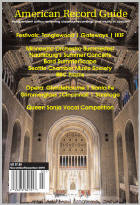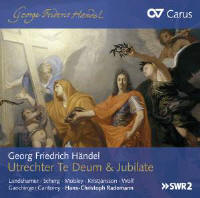Texte paru dans: / Appeared in:
Carus
|
|
|
Outil de traduction ~ (Très approximatif) |
|
|
Reviewer: John
W. Barker The title given to this release is a little misleading, identifying just the Te Deum and Jubilate as contents. The full story makes it much more interesting. It actually demonstrates Handel’s first efforts to master and consolidate the qualities of Englishness on which he would build so much of creative life.
The Treaty of Utrecht ended the War of Spanish Succession. Its celebration was to be carried out by the English court in the summer of 1713. This would fall in exactly the time period where, playing hooky from his official post in Hanover, Handel was testing his fortunes in London. In February 1711 he made a great triumph with his Italian opera Rinaldo and then had further success in November 1712 with his pastorale, Il Pastor Fido. Moreover, the reigning English queen, Anne, would be celebrating her birthday in January of 1713, and the two occasions would be linked.
Handel secured commissions to write music for both occasions. He recognized his opportunity to build significantly on his growing reputation in London. As a kind of background setting, Rademann gives first an orchestral suite drawn from Il Pastor Fido. The purpose is somewhat compromised by the fact that some of the music comes not from the 1712 score but from revised versions that Handel made in 1734. At least the performance here has more Baroque and rustic flavor than Beecham’s coldly magisterial and super-suave readings in the past. We get down to business with the Birthday Ode for Queen Anne. For both that and the two canticles the texts were in English, the one in ephemeral court poetry, the other two in Anglican translations of the original Latin. In both there was the then-prevailing background of Henry Purcell’s settings. Handel studied Purcell’s prototypes and learned what he could emulate and expand on. All of this gave Handel the “Englishness” that would mark so much of his work. There is a lot of lovely music in all this, and I was particularly delighted to hear so many anticipations of his wondrous English choral writing to come.
Putting together in one recording the two scores generated by the Utrecht celebrations makes great sense; indeed, it is strange that it has never been done before. I can trace nine earlier recordings of the Birthday Ode, including some worthwhile ones under Simon Preston, Robert King, and Stephen Cleobury, none of which seem available now. I surveyed these in my review (J/F 2010) of the newest one, for Harmonia Mundi (902041), which is undermined by utterly unintelligible English diction. For the Utrecht Te Deum and Jubilate, I know of some fine ones under Geraint Jones, Simon Preston, and John Scott. I surveyed these in my review (J/F 2011) of the latest one, under Jos van Veldhoven for Channel (29610). Though I had some reservations about Rademann’s tempos at first, I was quickly won over by the vivacity, propulsiveness, and warmth of his leadership. These works really come alive for me in ways I have not encountered before. The period performers are just right. (I particularly relished the delicate bass twangs of the theorbo, discreetly positioned in the continuo.) The sound is particularly excellent, with very clear directional effects.
| |
|
|
|
|
Cliquez l'un ou l'autre
bouton pour découvrir bien d'autres critiques de CD |
|




